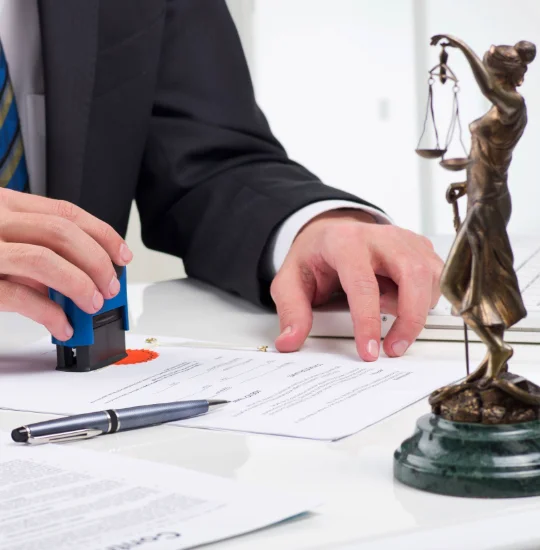Guiding You Through the Probate Process with Care and Expertise
Navigating the probate process can be overwhelming, especially during a time of loss. Our experienced probate attorney is here to handle the legal complexities for you, ensuring that your loved one’s estate is managed efficiently and in accordance with their wishes.
What is Probate?
Probate is the court-supervised process that occurs after someone passes away, ensuring that their assets are properly distributed according to their will or state law if no will exists. During probate, the court appoints an executor or personal representative who is responsible for managing the estate. This includes gathering assets, paying off debts, and distributing the remaining property to beneficiaries.
Why You May Need Probate Services
Probate is often required for estates that include assets like real estate, bank accounts, and other valuables that are not jointly owned or designated with a beneficiary. Without professional guidance, the probate process can be complex, time-consuming, and costly. Our attorney ensure that all legal requirements are met, helping to minimize delays and disputes among beneficiaries.
Our Probate Services
We offer comprehensive probate services to help executors, personal representatives, and beneficiaries manage their loved one’s estate. Our team handles every aspect of the probate process, providing expert legal guidance from start to finish.
Probate Administration
Probate administration involves handling the entire legal process of managing the estate of a deceased person. This includes filing the necessary documents with the probate court, identifying and valuing assets, paying off debts and taxes, and distributing the remaining assets to the rightful beneficiaries. Our attorney will manage these tasks on your behalf, making sure that the process is handled efficiently and according to the law.

Filing the Will and Petition for Probate
We’ll help you file the necessary legal paperwork to initiate the probate process and appoint an executor or administrator.
Inventory and Valuation of Assets
We assist in identifying, gathering, and valuing the estate’s assets, ensuring a complete and accurate inventory for the court.
Payment of Debts and Taxes
Our team will handle the payment of outstanding debts and taxes, ensuring that creditors are properly notified and any tax obligations are fulfilled.
Distribution of Assets
Once the debts are settled, we will guide you through the process of distributing the remaining assets to the beneficiaries, in accordance with the will or state law.

Trust Administration
If the deceased person created a trust, it may need to be administered by a trustee. Our attorney help trustees fulfill their fiduciary responsibilities, including distributing trust assets, managing investments, and ensuring compliance with the terms of the trust. Trust administration can be complex, and we provide legal guidance to ensure everything is handled properly and in accordance with the trust’s terms.
Grounds for Contesting a Will
We assist clients in identifying valid grounds for challenging a will, such as lack of capacity, undue influence, or improper execution.
Mediation and Litigation
Our team strives to resolve disputes through negotiation and mediation, but if a resolution cannot be reached, we will advocate for your interests in court.
Breach of Fiduciary Duty
If you believe the executor or trustee has mismanaged the estate or trust, we can represent you in claims of breach of fiduciary duty.
Asset Recovery
In cases where assets are missing or have been wrongfully distributed, we can help recover those assets for the rightful beneficiaries.
Ancillary Probate
If the deceased owned property in another state, an ancillary probate may be required to administer those out-of-state assets. Our attorney handle the additional legal processes involved in managing property across state lines, ensuring that all probate matters are resolved efficiently.

The Probate Process
While each probate case is unique, the process typically follows these steps:
1
Filing a Petition with the Probate Court
The process begins when a petition is filed with the court to either admit the will to probate and appoint an executor or, if there is no will, to appoint an estate administrator.
2
Inventorying and Valuing Assets
All assets of the deceased must be identified and valued. This includes real estate, bank accounts, investments, and personal property. Our team works with appraisers and experts to ensure a thorough and accurate valuation.
3
Notifying Creditors and Paying Debts
The executor or administrator is responsible for notifying creditors of the deceased’s passing and settling any outstanding debts. This also includes filing the final tax returns for the estate.
4
Distributing Assets to Beneficiaries
Once debts and taxes have been paid, the remaining assets are distributed to the beneficiaries according to the will or state intestacy laws (if there is no will).
5
Closing the Estate
Once all legal and financial matters are resolved, a final petition is filed to close the estate, officially completing the probate process.
Why Work With Us for Probate Services?
Experienced Guidance
Our attorney have years of experience handling probate cases, ensuring that every aspect of the process is completed smoothly and efficiently.
Compassionate Support
We understand that dealing with the probate process during a time of loss can be challenging. Our team provides compassionate support, guiding you through the legal steps while easing your stress.
Minimizing Delays
Probate can be a time-consuming process, but our proactive approach helps minimize unnecessary delays, ensuring the estate is settled as quickly as possible.
Transparent Communication
We keep you informed every step of the way, explaining your options and making sure you understand what’s happening with the estate.
Common Questions About Probate
Do all estates have to go through probate?
Not all estates require probate. Small estates or those where assets are held in a trust or have named beneficiaries may bypass the probate process.
How long does probate take?
The probate process can vary depending on the size and complexity of the estate. It typically takes between 6 to 12 months, but some cases may take longer if there are disputes or complications.
Can probate be avoided?
Yes, there are ways to avoid probate, such as using living trusts, joint ownership, and beneficiary designations. Our estate planning services can help you set up a plan that avoids probate for your loved ones.
Contact Us for Expert Probate Assistance
Whether you’re navigating probate for the first time or need help resolving a complex estate matter, we are here to provide expert legal support. Contact us today to schedule a consultation and ensure that your loved one’s estate is handled with the care it deserves.

